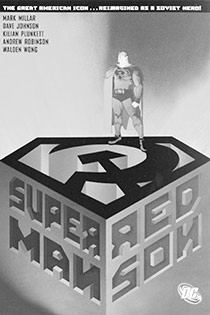Reading Between The Lines: It's a bird, it's a plane, it's...

We've seen Spiderman father a daughter with his superpowers in Spider-Girl. We've seen the goddamned Batman re-imagined (unintentionally) as a hilarious psychopath. Conversely, we've also seen Batman re-imagined as the hero of a Victorian-era penny dreadful hero. As for the world's most overpowered boy scout, Superman has been re-imagined as having been sent to Krypton from Earth, and even crash-landing onto Wayne Manor to become a superhuman Batman. Point being, sky's the limit when it comes to re-imagining superheroes with an established canon and personality. In this DC Elseworld's comic miniseries, Superman: Red Son tackles a much more ordinary (yet equally, if not more, compelling) question: what if the All-American were instead an agent of the reds, sympathizer of Lenin, a superhuman communist?
Superman: Red Son takes on this alternate universe story with some interesting results. Despite the Man of Steel landing on a Russian collective farm instead of the Kent's due to a matter of a few hours, his do-gooder personality isn't altered in any way. Superman comics generally tend to shy away from politics, with the few (excluding President Lex Luthor, remember that?) being portrayed as either well-meaning, harboring a grudge, or at worst, one-dimensionally corrupt. Red Son's Superman still retains his boy scout (or should it be Stalin Youth?) personality, his want of righting wrongs, but this time, is forced to make more than a comfortable share of concessions, being forced to ignore the U.S.S.R.'s corrupt internal politics. An interesting sense of inner conflict is added, as Kal-El is forced to play propaganda tool while Uncle Joe lets people starve in breadlines, going beyond the old device of his guilt of not being able to save everyone at once.
In keeping with the shifted nature of this alternate universe, several of our favourite Superman characters have been given all new roles but still retain their quirks. Most notably, Lex Luthor, however, has barely changed, other than being a “good guy” as a top US government scientist. Luthor still retains an intellect as massive as his ego, his obsession of destroying Superman only slightly justified that it was assigned to him as a high-priority objective. Lois Lane remains lustful as ever for the Russian superhero, and Jimmy Olsen, despite his role as a secret service agent, remains as easily amazed as ever. The retooling of Superman inevitably led to retooling the origins of and roles of various DC heroes. I won't give away much, but the recreation of Batman in particular steals the show.
Ultimately, what makes Red Son triumph as an original alternate universe story is not just the exploration of a darker side of Superman's desire to protect, but its creation of an entirely new postwar world. Unlike alternate universe Cold War fiction like Watchmen, instead of simply juxtaposing Superman and comrades alongside real-world events like the Vietnam war or Afghanistan invasion to give the story framework, Red Son takes full advantage of its DC catalog of superheroes to create a very different comic bookish world that still retains the Orwellian atmosphere of Soviet Russia and the freedom-lovin' U.S.A. needed to make the setting work. The irony of my written comparison aside, Red Son deftly avoids any chances of being compared to Watchmen.
As a non-Superman fan, I highly recommend reading Superman: Red Son. The complete revamping of the Superman mythos makes it easy and accessible enough for any casual reader to get into, but the fantastic approach taken to this rather simple premise is reason enough to head down to your local comic book store and fork over a twenty for a paperback of this comic.
Reading Between The Lines explores books that you may have missed out on that are worth your while. If you have a book to suggest, email Eshaan at e_gupta@fanshaweonline.ca.













